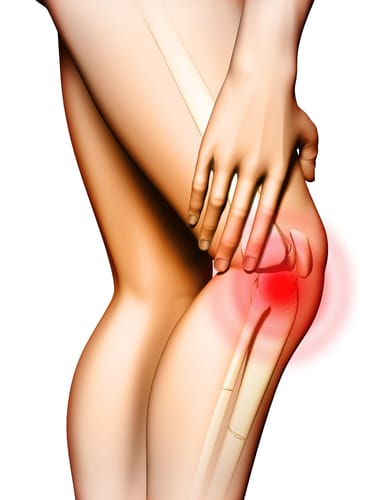
Knees: A Body Part Under Stress
Your knees are exposed to a significant amount of stress when you exercise and they can only move in a single plane. This makes them best suited for bending and straightening your legs. They’re less well suited for twisting motions of the leg common in certain sports. That’s why ligament damage is a frequent problem in athletes. Knees are susceptible to other injuries too. The patellar tendons can become inflamed, especially in people who do a lot of jumping. This is referred to as patellar tendonitis. The cartilage that keeps bones from rubbing together can become torn or damaged as well.
When you have tendonitis, ligament or cartilage damage, you typically have other symptoms such as knee pain, swelling or limitations in motion. What if you don’t have pain but your knees crack and pop when you exercise? Should you be concerned?
Knee Noises: What Causes Noisy Knees?
Crackling or popping knees is known as crepitus. You can experience crepitus as crackling or popping or as a grinding sound when you get up from a chair, do squats or bend down to pick something up. Crepitus can affect any joint, not just your knees. With crepitus, you can actually FEEL crackling and popping underneath your hand when you place your hand on your knee and bend and straighten your leg.
So what causes crepitus? It can be a sign of arthritis in the knees or a condition called chondromalacia, BUT with these conditions you usually have pain. If you have crepitus without pain, swelling or other knee signs or symptoms, it’s usually not a cause for concern. Crepitus in a normal knee can be due to pressure changes in the synovial fluid inside the joint capsule of the knee. These pressure changes cause gases dissolved in the synovial fluid to coalesce to form bubbles. When the bubbles pop they create a popping or crackling sound.
What causes changes in pressure? Overstretching a joint can do it. Sometimes tendons and ligaments move slightly out of place when you move your leg. You may hear a snapping sound as they slide back into place. Stretching after your workout to lengthen the muscles and tendons helps to prevent this. These causes of noisy knees are usually not something to be concerned about.
Knee Pain and Knee Noises
Knee noises aren’t necessarily a sign of knee problems BUT if you have other signs and symptoms like knee pain, swelling, stiffness or decreased range-of-motion, you should have it evaluated. Crepitus and knee pain may be a sign of osteoarthritis in the knee or a condition called chondromalacia. Osteoarthritis is damage to the cartilage the covers the ends of the thigh and shin bones. Cartilage helps to absorb shock when you move your legs. Chondromalacia is more common in younger people, especially runners. It’s due to cartilage inflammation and usually gets worse when you walk up or down stairs or do squats. Chondromalacia is more common in women because their kneecaps are more likely to track abnormally when the walk or exercise.
Preventing Knee Problems
Knee popping and crackling is usually not something to be concerned about if you don’t have knee pain. Still, that popping and cracking is a reminder to do what you can to prevent future knee injuries. One way to lower your risk is to strengthen your thigh muscles and correct imbalances between your hamstrings and quadriceps muscles. Warm-up and cool-down after each workout. Don’t skip this step! Too many people do.
Do stretching exercises after each workout to increase flexibility. Wear shoes that support and cushion your feet to reduce the impact on your knees. When doing plyometric exercises that require jumping, land softly with your knees bent. Never land with straight legs. When doing squats, keep your feet lined up with your knees and facing forward. Never lock your knees during exercises. A good technique when squatting and lunging is important for keeping your knees healthy and pain-free.
Don’t suddenly increase the intensity of your exercise program. Have some days where you do low-impact exercise to give your knees a rest. Focus on strengthening your core too. Core muscle instability increases the risk for chondromalacia.
The Bottom Line?
Those knee crackle and pops are usually nothing to worry about unless you have other knee symptoms. Even so, it’s important to strengthen your thigh muscles, warm-up, and stretch, use proper form when squatting or lunging, wear supportive shoes and land with bent knees when jumping. Treat your knees with kindness and concern. You need them to support you for many more years.
References:
Mayo Clinic. “Chondromalacia Patella”
Medline Plus. “Anterior Knee Pain”
Related Articles By Cathe:
Why Are My Knees Hurting? 5 Common Causes of Knee Pain in Active People
When Your Knees “Crack” and “Pop” What Does It Mean?
Are Women at Higher Risk for Knee Problems?
Concerned Because Your Knees Make Noises When You Squat?

